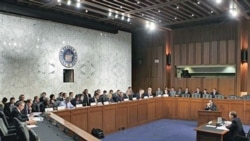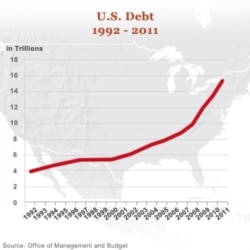This is the VOA Special English Economics Report.
An American congressional committee reported failure earlier this week. The committee failed in its effort to cut the federal budget deficit by $1.2 trillion over ten years.
The co-chairs of the Joint Select Committee on Deficit Reduction released a statement. It said, “we have come to the conclusion today that it will not be possible to make any bipartisan agreement available to the public before the committee’s deadline.”
Have an e-reader? Download this story as a PDF
The twelve-member committee was created under the Budget Control Act of twenty-eleven. The group was equally divided between the two main parties. The goal was to find acceptable ways to cut federal deficits. But, without an agreement, that will fall to involuntary cuts through the act of sequestration.
The budgetary terms sequester and sequestration mean that the Treasury Department will withhold or cancel a set amount of spending.
By law, equal cuts in both civilian and military spending will begin in twenty thirteen. A total of $1.2 trillion needs to be cut. This is in addition to cuts of about nine hundred billion dollars required by the budget law that created the congressional supercommittee.
Defense Secretary Leon Panetta has warned the combination of cuts could hurt his department.
LEON PANETTA: “If the sequester goes into effect and it doubles the number of cuts, then it will truly devastate our national defense.” 7 sec.
This has made some lawmakers feel uneasy. Representative Howard McKeon of California opposes new cuts in military spending.
HOWARD MCKEON: “National defense has contributed enough to deficit reduction.”
Many lawmakers are concerned that, with elections next year, programs important to voters in their areas will be cut. That would add to increasing voter anger over what they consider a lack of action by lawmakers.
Many voters share the feelings of this man in Houston, Texas, when asked about Congress.
HOUSTON MAN: “They all need to be replaced -- every last one of them.”
REPORTER: “How would you do that?"
HOUSTON MAN: “Don't vote for them next time; vote for somebody else.”
But President Obama has warned Congress that he will block any efforts to cancel the spending cuts.
BARACK OBAMA: “Already, some in Congress are trying to undo these automatic spending cuts. My message is simple: No. I will veto any effort to get rid of those automatic spending cuts.”
Experts say that Congress and the Obama administration could still reach agreement on budget cuts and taxes before the sequestration takes effect.
And that's the Economics Report in VOA Special English. Find transcripts and MP3s of our programs at voaspecialenglish.com. I'm June Simms.
___
Contributing: Greg Flakus and Marissa Melton






